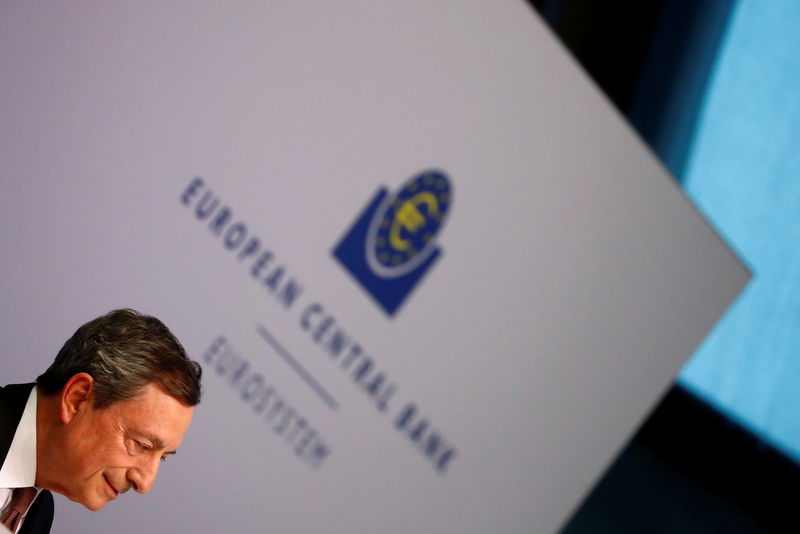By Francesco Canepa
FRANKFURT (Reuters) - Battered by years of low interest rates, euro zone banks are looking at a multi-billion-euro consolation prize if the ECB grants them an expected reprieve from its penalty charge on deposits, according to Reuters calculations.
But the windfall that would result if the European Central Bank introduced a tiered deposit rate - something policymakers have been debating for months - is unlikely to be distributed equally, with lenders in France and Germany best placed to benefit from a complex but clumsy system.
With global trade tensions morphing into a currency war, the ECB is likely to cut its -0.4% deposit rate - effectively a charge on banks’ idle cash - further into negative territory in September. Markets are pricing a rate of -0.6% by the end of 2019.
The cut will probably be accompanied by a pledge to keep rates at rock bottom for even longer and by new bond purchases - all measures aimed at keeping a lid on the euro and euro area borrowing costs.
This spells trouble for banks, which are already extending loans at record-low rates and cannot pass on the ECB’s deposit charge to households – the main source of funding for many of them.
To soften the blow, ECB President Mario Draghi said any cut would come with "mitigating measures", likely a partial exemption from that charge in the form of tiered deposit rates.
"The drop in yields will further pressure revenues," Marco Troiano, a director at ratings agency Scope, said. "The introduction of a tiered rate could soften the blow, especially to banks with significant excess liquidity."
Banks are currently paying some 7 billion euros ($7.8 billion) per year to the ECB on cash parked there that exceeds mandatory reserves.
This would rise to 8.8 billion euros if the deposit rate was cut to -0.5%, according to Reuters calculations, based on data to end-June.
Nothing is known about what the ECB's tiered system might look like. But experience with similar schemes from Japan to Switzerland suggests it may worth between 4.4 and 6.6 billion euros per year, assuming a 10-basis-point rate cut and depending on how it is designed.
POTENTIAL PITFALLS
Whatever option is chosen, designing such a scheme won't be easy in a bloc where cash is distributed unevenly among countries, and it could even backfire by pushing rates up in certain countries, rather than down.
The Swiss National Bank exempts bank deposits worth 20 times their minimum reserves from its -0.75% charge.
If the ECB were to grant a reprieve on up to 10 times' minimum reserves, euro zone banks would save 5.3 billion euro per year compared to now and 6.6 billion euros compared to a flat -0.5% rate.
(GRAPHIC - Euro zone excess liquidity components: https://tmsnrt.rs/2MDHRrQ)
But with excess cash concentrated in richer countries with large financial centers, disproportionate savings would be seen in Germany and France, exceeding 1 billion euros in each country.
This means banks with room under the tiering threshold, typically in peripheral countries such as Italy and Spain, could take some of the cash they are lending to their peers at a negative rate and park it at the ECB for free.
This would likely drive up borrowing costs in the wholesale bank funding market, jeopardizing one of the ECB’s main goals.
Alternatively, the ECB could provide an exemption on a portion of banks’ excess reserves, as the Bank of Japan is doing.
If set at half the total, this would result in a saving of 2.6 billion euros compared to the current situation and 4.4 billion euros if applied to all excess reserves.
This option, too, would lend itself to being gamed if banks artificially increased their excess liquidity by lending less or issuing more short-term debt.
HARMING POLICY TRANSMISSION?
Banks confident of being able to grow lending volumes could even tap the ECB itself for multi-year cash at a negative rate under its Targeted Longer Term Refinancing Operations (TLTRO).
"The implementation of measures to mitigate the impact of negative rates on central bank deposits is complex and could inadvertently create arbitrage opportunities for some banks, thus harming the money markets functioning and monetary policy transmission," Giuseppe Maraffino, an analyst at Barclays (LON:BARC), said.
One way around this would be to calculate any exemption threshold based on past figures, such as an average of the previous year's reserves.
Alternatively, Maraffino suggested allowing only banks that deposited more at the ECB than they borrow from it to have access to the tiered rate, thus eliminating arbitrage opportunities for others.
Banks don't disclose their reserve requirements or excess liquidity, making estimates for such a system harder to formulate.
But it is easy to imagine that such a scheme would most benefit banks in cash-rich countries such as Germany and larger peripheral lenders, while leaving out smaller lenders.

Deutsche Bank (DE:DBKGn), one of the most vocal advocates of tiering, warned last month of a "significant impact" on revenues unless the scheme was introduced.